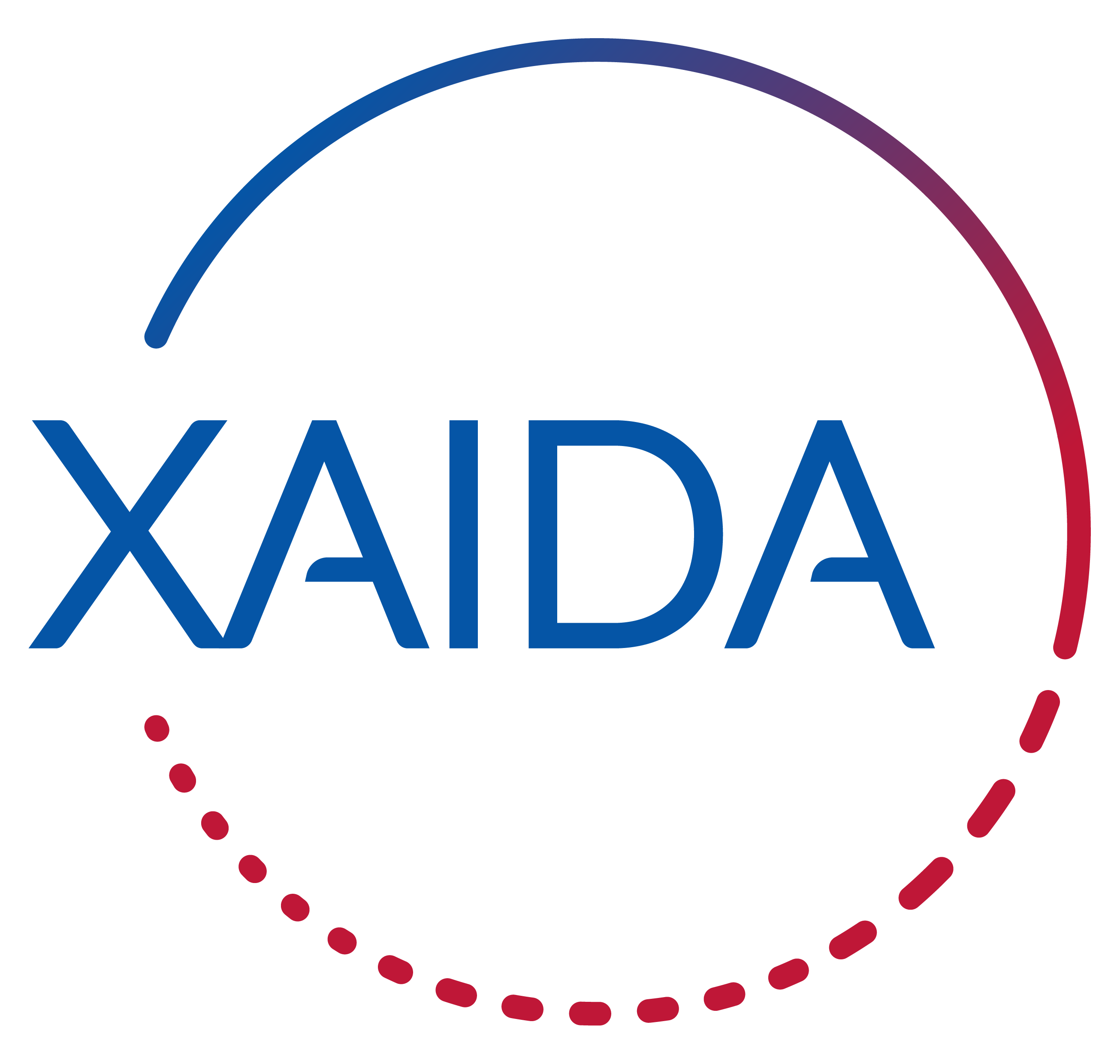eXtreme events : Artificial Intelligence for Detection and Attribution
Eighteen European research institutes are joining forces with climate risk practitioners to better assess and predict the influence of climate change on extreme weather using novel artificial intelligence methods. This new EU-funded 4-year project, called “XAIDA”, started in September 2021.
In 2021, Geert Jan van Oldenborgh, one of the initiators of XAIDA, passed away. He also laid down the foundations of rapid attribution.


Extreme Events
End-of-project Event
What are the Extreme Events?
News

Climate Extremes & Societal Risks
For this final event together with the MYRIAD project, XAIDA chose to focus on Climate Extremes & Societal Risks. This will take place at Vrije Universiteit Amsterdam on December 17th and 18th. A public event inviteing all partners and stakeholders will take place in the afternoon on December 17th.
Check out the lectures and details.
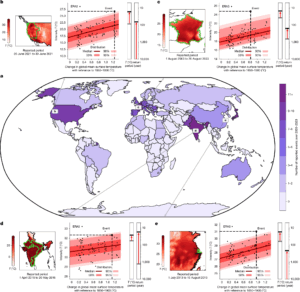
Paper: Systematic attribution of heatwaves to the emissions of carbon majors
« Researchers analysed the emissions that were facilitated by the 180 largest producers of fossil fuels and cement – referred to in the study as “carbon majors”. The emissions from these carbon majors account for 60 percent of humanity’s total cumulative CO2 emissions from 1850 to 2023, with the rest of the CO2 emissions largely attributable to land use activities. The researchers then calculated the contribution of each carbon major to the change in global average temperature. »

Teaching Material: Why are football pitches flooding?
XAIDA is collaborating with the PSTT (Primary Science Teaching Trusts) collaborators. PSTT produces some teaching material based on XAIDA work.
This work is based on the attribution work led by several of XAIDA scientists conducted with the World Weather Attribution (WWA).
Read more on Attribution of Extreme Weather Event!
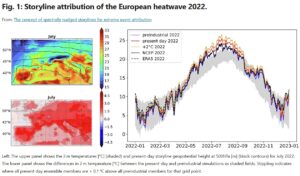
Paper: The concept of spectrally nudged storylines for extreme event attribution
Read the paper: The concept of spectrally nudged storylines for extreme event attribution.
» (…) Spectrally nudged storylines thus offer a new, easily implemented and easily understandable way of communicating climate change to the general public and decision-makers, as well as a pathway for detailed attribution of climate impacts. The technique offers great potential as an addition to the established attribution methods by answering different questions and providing new attribution results. »
A collaboration between XAIDA and CLINT EU projects.

Teaching Materials: Videos on Extreme Events for Primary Students
XAIDA’s partner Office for Climate Education (OCE) worked on Teaching Materials including here a video series.
The ‘CLIM’ series, developed by the Office for Climate Education in collaboration with XAIDA researchers focuse on extreme weather phenomena.
Read and wathc more!

XAIDA Webinar #18
The 18th session of our webinar will occur on June 10th, 2025 at 10AM (10:00) CET. During this webinar Dr. Pradeebane Vaittinada Ayar will discuss his work on ‘Ensemble Random Forest for Tropical Cyclone Tracking’.
‘Even though tropical cyclones (TCs) are well documented during the intense part of their lifecycle until they start to evanesce, many physical and statistical properties governing them are not well captured by gridded reanalysis or simulated by Earth system models. Thus, the tracking of TCs remains a matter of interest for the investigation of observed and simulated tropical cyclones. Two types of cyclone tracking schemes are available. On the one hand, some trackers rely on physical and dynamical properties of the TCs and user-prescribed thresholds, which make them rigid. They need numerous variables that are not always available in the models.
On the other hand, trackers are leaning on deep learning, which, by nature, needs large amounts of data and computing power.’
Check out the details to attend and follow the discussion!
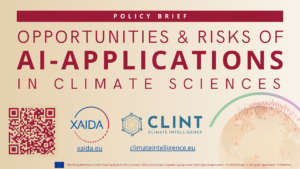
POLICY BRIEF: Opportunities & Risks of AI-applications in Climate Sciences
Artificial Intelligence (AI) is unlocking new frontiers in climate science and climate services—from improving impact-based seasonal forecasts to longer-horizon climate risk projections. However, the rapid growth of AI also brings challenges related to reliability, interpretability and trustworthiness. To fully harness AI’s potential while maintaining public trust, we need to invest in data-driven and hybrid models, transparent and open data practices, and robust validation. Funders, academics, and climate-tech startups must work together to develop scientifically credible AI-based climate services – at a time when informed responses to climate risks are more critical than ever.

XAIDA Webinar #17
The 17th session of our webinar will occur on April 23rd, 2025 at 2PM (14:00) CET. During this webinar Dr. Simon Klein will discuss the current work he is developing whit his team at the Office for Climate Education (OCE) for adapting research topics covered by XAIDA teams into class activities, ready for use for middle school teachers around the globe.
Check out the details to attend, discuss and follow the discussion!
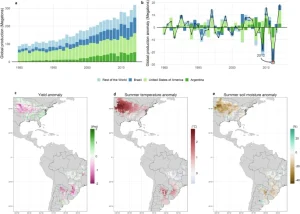
Paper: One third of the Global soybean production failure in 2012 is attributable to climate change
Read the paper: In 2012, soybean crops failed in the three largest producing regions due to spatially compounded hot and dry weather across North and South America. Here, we present different impact storylines of the 2012 event, calculated by combining a statistical crop model with climate model simulations of 2012 conditions under pre-industrial, present-day (+1 °C), and future (+2 °C) conditions. These simulations use the ECHAM6 climate model and maintain the same observed seasonally evolving atmospheric circulation. Our results demonstrate that anthropogenic warming strongly amplifies the impacts of such a large-scale circulation pattern on global soybean production. Although the drought intensity is similar under different warming levels, larger crop losses are driven not only by warmer temperatures but also by stronger heat-moisture interactions. We estimate that one-third of the global soybean production deficit in 2012 is attributable to anthropogenic climate change. Future warming (+2 °C above pre-industrial) would further exacerbate production deficits by one-half compared to present-day 2012 conditions. This highlights the increasing intensity of global soybean production shocks with warming, requiring urgent adaptation strategies.
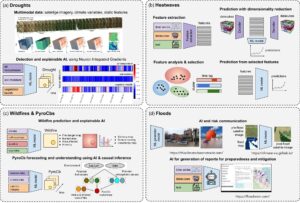
Paper: Artificial intelligence for modeling and understanding extreme weather and climate events
Read the paper: Artificial intelligence for modeling and understanding extreme weather and climate events
» In recent years, artificial intelligence (AI) has deeply impacted various fields, including Earth system sciences, by improving weather forecasting, model emulation, parameter estimation, and the prediction of extreme events. The latter comes with specific challenges, such as developing accurate predictors from noisy, heterogeneous, small sample sizes and data with limited annotations. This paper reviews how AI is being used to analyze extreme climate events (like floods, droughts, wildfires, and heatwaves), highlighting the importance of creating accurate, transparent, and reliable AI models. (…) »
A collaboration between XAIDA and CLINT EU projects but also USMILE, AI4PEX, ELIAS, MeDiTwin, DeepCube and several national programmes.
